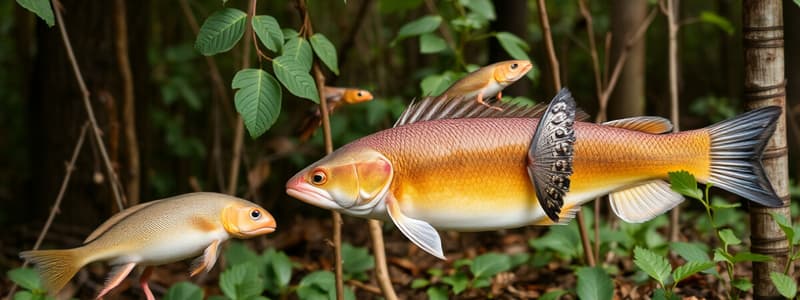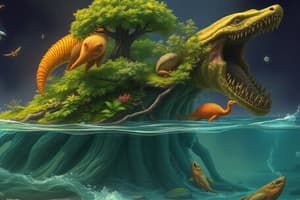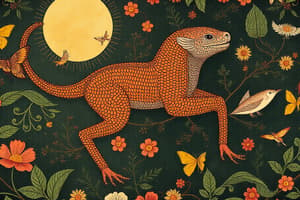Podcast
Questions and Answers
If a disease strikes the snake population in the food chain shown, what will be the initial effect on the populations of hawks and rabbits? (Select all that apply)
If a disease strikes the snake population in the food chain shown, what will be the initial effect on the populations of hawks and rabbits? (Select all that apply)
- The population of hawks will decrease. (correct)
- The population of rabbits will decrease.
- The population of hawks will increase.
- The population of rabbits will increase. (correct)
In the stable food chain shown, what would you expect to happen initially if you were to suddenly double the population of rabbits? (Select all that apply)
In the stable food chain shown, what would you expect to happen initially if you were to suddenly double the population of rabbits? (Select all that apply)
- The hawk population would remain unchanged.
- The grass population would increase.
- The grass population would decrease. (correct)
- The snake population would increase. (correct)
What event within the food chain might lead to the graph shown below?
What event within the food chain might lead to the graph shown below?
A disease in the population of rabbits.
What most likely caused the rabbit population to decrease over the first time unit shown in the following graph?
What most likely caused the rabbit population to decrease over the first time unit shown in the following graph?
Trapping has severely reduced the population of rabbits in an ecosystem. What is the most likely effect this will have on other organisms?
Trapping has severely reduced the population of rabbits in an ecosystem. What is the most likely effect this will have on other organisms?
Flashcards are hidden until you start studying
Study Notes
Impact of Disease on Food Chain
- A disease affecting the snake population leads to a decrease in hawks and an increase in rabbits.
Consequence of Increased Rabbit Population
- Doubling the rabbit population causes a decrease in grass and an increase in both snake and hawk populations.
Event Indicating Population Changes
- A disease in the rabbit population could lead to observable changes in the food chain dynamics.
Causes of Rabbit Population Decline
- A higher-than-normal snake population is likely responsible for the decrease in rabbits over time.
Effects of Rabbit Trapping
- Significant reduction in rabbit populations results in a rapid decline of snakes and a swift increase in grass populations.
Studying That Suits You
Use AI to generate personalized quizzes and flashcards to suit your learning preferences.



